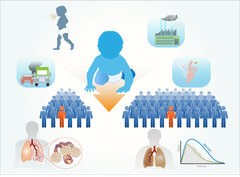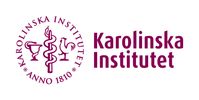Early-life events linked to lung health in young adulthood
Early-life events, such as the exposure to air pollutants, increases the risk of chronic lung disease in young adulthood, according to new results by researchers at Karolinska Institutet, Sweden, published in the European Respiratory Journal and Thorax. The studies add to the growing evidence that chronic lung disease in adulthood can be traced back to childhood.

Chronic bronchitis and chronic obstructive pulmonary disease (COPD), with the hallmark features phlegm and irreversible airflow limitation, respectively, are lung diseases known to affect adults with a history of long-term smoking.
“To our surprise, we found the prevalence of chronic bronchitis and irreversible airflow limitation to be rather high (5.5% and 2.0%, respectively), considering the young age of the study participants.” says senior author Erik Melén, professor and paediatrician , Department of Clinical Science and Education, Karolinska Institutet, Södersjukhuset.
“Those diseases are usually diagnosed in patients older than 50 years of age”, comments further co-author Anders Lindén, professor and pulmonologist, Institute of Environmental Medicine.
Young adults followed from birth
In the present studies, the researchers used data from birth up to age 24 years from the follow-up of the Swedish population-based birth cohort BAMSE (Swedish abbreviation for Child (Barn), Allergy, Milieu, Stockholm, Epidemiological), which includes 4,089 participants from the Stockholm area recruited 1994-96.
Analyses performed by PhD student Gang Wang showed that smoking as well as early-life air pollution exposures and childhood asthma are risk factors for chronic bronchitis, whereas breast-feeding was identified as a protective factor. In addition, the early-life risk factors for development of irreversible airflow limitation were recurrent lung infections, asthma, and exposure to air pollution.
Air pollution and smoking as preventable risk factors
“The levels of air pollutants in the current study mainly reflect local emissions from road traffic, which implies that this preventable risk factor may play an important role in the development of chronic lung disease in young adults.” says professor Erik Melén. Given that air pollution levels in Stockholm are comparatively low by international standards, this makes the current findings very important in a global context. And despite the young participants’ age, active smoking was linked to chronic bronchitis, which underlines the negative health effects from even a limited period of exposure to tobacco smoke.
“In conclusion, our two novel studies demonstrate that chronic bronchitis and irreversible airflow limitation do exist in young adults and emphasize the importance of early-life events for maintaining lung health during adulthood. The take home-message is: If you want to prevent disease, early prevention is the key to success.”
The study was financially supported by the European Research Council (TRIBAL, 757919), the Swedish Research Council, the Swedish Heart-Lung Foundation, Region Stockholm and the China Scholarship Council.
Publications: “Assessment of chronic bronchitis and risk factors in young adults: results from BAMSE”, Gang Wang, Jenny Hallberg, Petra Um Bergström, Christer Janson, Göran Pershagen, Olena Gruzieva, Marianne van Hage, Antonios Georgelis, Anna Bergström, Inger Kull, Anders Lindén, and Erik Melén. European Respiratory Journal, online 12 November 2020, doi: 10.1183/13993003.02120-2020.
“Early-life risk factors for reversible and irreversible airflow limitation in young adults: Findings from the BAMSE birth cohort”, Gang Wang, Inger Kull, Anna Bergström, Jenny Hallberg, Petra Um Bergström, Stefano Guerra, Göran Pershagen, Olena Gruzieva, Marianne van Hage, Antonios Georgelis, Christer Janson, Anders Lindén, and Erik Melén. Thorax, online November 12 2020, doi: 10.1136/thoraxjnl-2020-215884.
For more information, please contact: Erik Melén, professorDepartment of Clinical Science and Education Södersjukhuset, Karolinska InstitutetPhone: +46 706 68 91 94Mail: erik.melen@ki.se
Contacts
Contact the Press Office and download photo: ki.se/pressroom
Images



Karolinska Institutet (http://ki.se/en) is one of the world’s leading medical universities. Our vision is to advance knowledge about life and strive towards better health for all. Karolinska Institutet accounts for the single largest share of all academic medical research conducted in Sweden and offers the country’s broadest range of education in medicine and health sciences. The Nobel Assembly at Karolinska Institutet selects the Nobel laureates in Physiology or Medicine.
Subscribe to releases from Karolinska Institutet - English
Subscribe to all the latest releases from Karolinska Institutet - English by registering your e-mail address below. You can unsubscribe at any time.
Latest releases from Karolinska Institutet - English
Fluoride in drinking water is associated with impaired childhood cognition7.3.2025 15:30:00 CET | Pressmeddelande
Elevated concentrations of fluoride can occur in well water, and in some countries, it is added to drinking water to counteract caries in the population. A study from Karolinska Institutet in Sweden now supports a few previous studies indicating that exposure to fluoride during the fetal stage or early childhood may impair cognition in children. The study is published in the journal Environmental Health Perspectives.
Children with ARFID face increased risk of disease17.2.2025 17:00:00 CET | Pressmeddelande
Children with avoidant restrictive food intake disorder (ARFID) have an elevated risk of developing psychiatric and physical conditions, a new study from Karolinska Institutet published in JAMA Pediatrics reports. The study highlights the importance of early identification to improve care of these children.
Preterm babies receive insufficient pain management27.1.2025 15:29:17 CET | Pressmeddelande
A large proportion of babies born very early need intensive care, which can be painful. But the healthcare system fails to provide pain relief to the full extent. This is shown by the largest survey to date of pain in neonatal care, now published in the journal Pain.
New study paves way for immunotherapies tailored for childhood cancers20.1.2025 17:00:00 CET | Pressmeddelande
Researchers at Karolinska Institutet and the Astrid Lindgren Children’s Hospital in Sweden have determined how children’s immune systems react to different kinds of cancer depending on their age. The study, which is published in the journal Cell, reveals significant differences between the immune response of children and adults, and has the potential to lead to new tailored treatments for children with cancer.
AI can improve ovarian cancer diagnoses2.1.2025 11:00:00 CET | Pressmeddelande
A new international study led by researchers at Karolinska Institutet in Sweden shows that AI-based models can outperform human experts at identifying ovarian cancer in ultrasound images. The study is published in Nature Medicine.
In our pressroom you can read all our latest releases, find our press contacts, images, documents and other relevant information about us.
Visit our pressroom